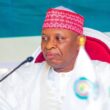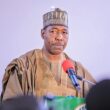The Coordinating Minister of Health and Social Welfare, Prof Muhammad Pate, has revealed that over 16,000 doctors left Nigeria in the last five to seven years to seek better opportunities in other countries.
Speaking at the 7th Annual Capacity Building Workshop organized by the Association of Medical Councils of Africa (AMCOA) in Abuja, Professor Pate shared that the current ratio of doctors to Nigeria’s population stands at 3.9 per 10,000 people. This is far below what is considered adequate for a functional healthcare system.
The minister said the migration is largely influenced by factors such as better working environments, improved training options, and more attractive financial incentives in foreign countries. “In Nigeria alone, over 16,000 doctors are estimated to have left the country in the last five to seven years, with thousands more leaving in just the past few years,” he stated.
The departure of healthcare workers extends beyond doctors. Pate noted that nurses and midwives are also leaving the country in significant numbers, further reducing the availability of essential medical personnel.
In addition to human resources, the economic loss is also considerable. Professor Pate pointed out that it costs over $21,000 to train one doctor in Nigeria. He described the mass migration as not only a loss of skilled workers but also a drain on public funds invested in training.
Despite the challenges, the minister said the situation presents a chance to rethink how the country manages its health workforce. He referred to the new National Policy on Health Workforce Migration as part of Nigeria’s strategy to retain healthcare workers and ensure that the system remains effective.
“The objectives are clear – To retain and motivate health workers currently serving in Nigeria—thousands of whom work under difficult conditions; to establish ethical norms and explore bilateral frameworks for recruitment, aiming to correct global asymmetries; to expand training capacity—not only for domestic needs, but to contribute to global workforce needs, to enable structured reintegration for the thousands of Nigerian professionals abroad; and to strengthen governance, improve regulatory coordination, and build real-time data systems,” he said.
AMCOA President, Professor Joel Okullo, supported the call for collaboration among African countries to improve regulation and leadership in healthcare. He expressed hope that the workshop would result in practical steps to boost healthcare across the continent.
“This year’s theme highlights our commitment to tackling the diverse array of challenges within the health regulatory landscape. It seeks to empower AMCOA members and associate members with the wisdom and skills needed for informed strategic and operational decisions in the coming year,” he said.
Also speaking at the event, Dr. Fatima Kyari, Registrar of the Medical and Dental Council of Nigeria, welcomed participants and appreciated Nigeria’s hosting of the event for the first time.
Meanwhile, Professor Afolabi Lesi, Chairperson of the MDCN Board and head of the workshop’s organizing committee, said that while governance efforts are on the right path, healthcare delivery suffers from internal conflict among medical professionals.
He noted, “The reality is that while we have committed and clear directions at the level of governance, implementation of actions is bedevilled by the fractioned and fractious relationship among health workers who ought to be working as a team, with the patient (well-being and safety) as the primary focus of all our actions.”










